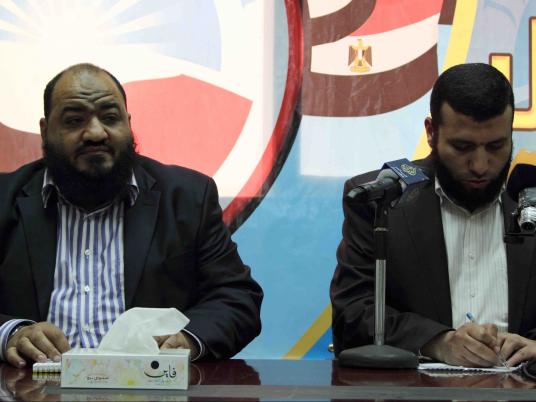
The Salafi Dawah and its political wing, the Nour Party, announced on Sunday their endorsement of moderate Islamist presidential candidate Abdel Moneim Abouel Fotouh, in a move that may hurt the chances of Muslim Brotherhood nominee Mohamed Morsy.
At a news conference, Mohamed Nour, a Nour Party leader, revealed that Abouel Fotouh had fiercely defeated his Islamist contenders in three different polls conducted among the Nour Party’s members of Parliament, members of its high board and the Salafi Dawah Shura Council.
The surveyed Salafis chose between Abouel Fotouh, a former leader of the Muslim Brotherhood, Morsy, the president of the Freedom and Justice Party and Mohamed Selim al-Awa, an Islamist lawyer.
Seventy-four MPs supported Abouel Fotouh, while 30 backed Morsy and only one voted for Awa. On the Nour Party high board in particular, Abouel Fotouh secured eight votes, Morsy three and Awa one. And of the Salafi Dawah preachers, 121 voted for Abouel Fotouh while Morsy and Awa secured the votes of 26 and three members, respectively.
“All three belong to the same Islamist project. We have issues with this project but there is no room for that now,” said Abdel Moneim al-Shahat, spokesperson for the Salafi Dawah, in reference to deep-rooted ideological feuds between Salafis and the three candidates over the correct understanding of Sharia.
“What counts now is presenting an Islamist candidate who believes in the Islamic frame of reference and has popularity,” Shahat told reporters.
Despite his relatively liberal outlook, Abouel Fotouh secured the backing of the nation’s largest Salafi movement for merely pragmatic reasons. The Alexandria-based group believes Abouel Fotouh is the only Islamist candidate capable of standing up to secular nominee Amr Moussa in the upcoming race.
“With all due respect to Dr. Morsy, he has been at a disadvantage in terms of media coverage because he was fielded at the last minute. Plus, the media has launched a campaign against him,” said Shahat, casting doubts that Morsy could defeat Moussa.
Shahat said allegations that the Supreme Council of the Armed Forces had pressured Salafis not to back the Muslim Brotherhood’s candidate were “ridiculous.”
“This did not happen and will never happen and we can never accept it,” said Shahat.
He added that Salafis were inclined to back the Muslim Brotherhood’s initial candidate and influential leader, Khairat al-Shater, until the Presidential Elections Commission excluded him from the race. “Where was the SCAF then? Was there any intervention? And would the SCAF want Abouel Fotouh [to be president]?” Shahat asked in a rhetorical tone.
With its decision, the Salafi Dawah has dealt a blow to the Brotherhood, which has recently sought to convince all Islamist factions to throw their backing behind Morsy. Failing to secure the backing of a Salafi bloc that already holds almost one-quarter of parliamentary seats stands as a major loss for the Brothers. (we need a transition here)
Nevertheless, Mahmoud Ghozlan, the Muslim Brotherhood’s spokesperson, downplayed the impact of Salafi Dawah and Nour Party’s decision on Morsy’s chances.
“The Salafi Dawah and the Nour Party are one part of the Salafi trend in Egypt, and there are other parts that support Dr. Mohamed Morsy,” Ghozlan told Egypt Independent in a phone interview.
Last week, the Jurisprudence Commission for Rights and Reform, a religious organization formed by mostly Salafi clerics after Hosni Mubarak’s ouster, endorsed Morsy.
“We have the Brothers’ bloc, their supporters and sympathizers, and we will also exert efforts to convince non-politicized citizens [to back Morsy]. Hence, God willing, Dr. Morsy’s chances are high,” added Ghozlan.
He ruled out speculation that the nomination of more than one Islamist candidate would split the Islamist vote and eventually benefit non-Islamist candidates. Ghozlan sounded confident that the winner would come from the Islamist bloc, given people’s support for Islamists.
“In the parliamentary elections, we had more than one Islamist party. Yet, the sweeping majority went to Islamists,” he argued.
“If the vote is not rigged, the chances of other [non-islamists] candidates would be very slim, especially since the most prominent of them belong to the old [Mubarak] regime,” said Ghozlan, in reference to Moussa and Ahmed Shafiq, Mubarak’s last prime minister.
With less than a month standing between Egyptians and the presidential poll, rifts have intensified among Islamists over whom to back. While the Brotherhood has insisted that Islamists rally behind Morsy, different factions have leaned toward Abouel Fotouh.
Last week, Jama'a al-Islamiya held an internal vote that resulted in Abouel Fotouh garnering 44.1 percent support, versus 25.8 percent for Morsy. The group decided to repeat the vote this week, because according to its bylaws, the candidate it eventually supports must garner at least 50 percent plus one vote. According to sources close to Jama'a al-Islamiya, the group is reluctant to back Morsy because they fear the Brothers’ hegemony. The final decision is set to be handed down on Monday.
Recent polls have indicated that Morsy’s chances are slim. Some observers have argued the group should withdraw him from the race so as to spare itself an imminent defeat. Yet Ghozlan dismissed such calls.
“Saying that [Morsy] will lose is an aspect of the psychological war that others are waging against the group,” said Ghozlan. “Why would we pull him out [of the race]? At least Morsy has a respectable platform and has a group that supports him.”




